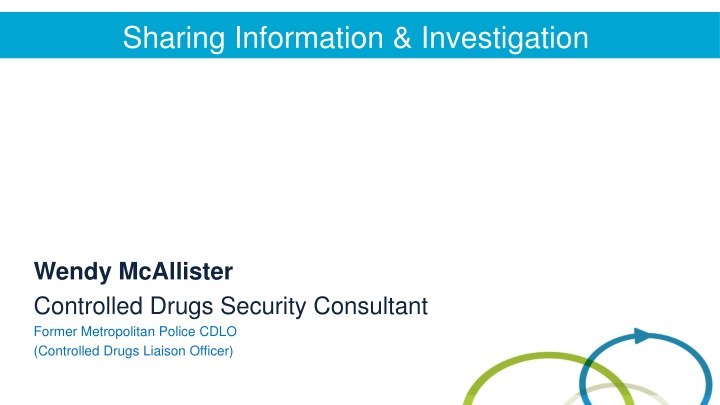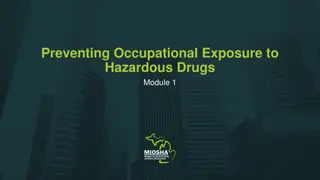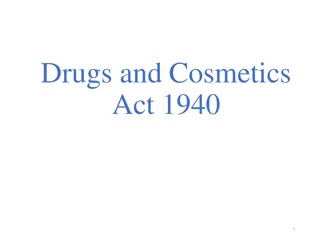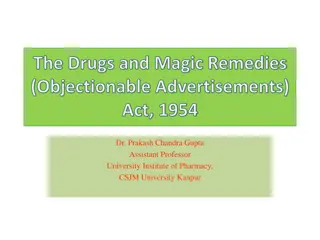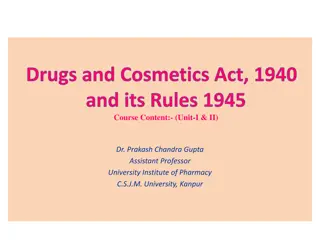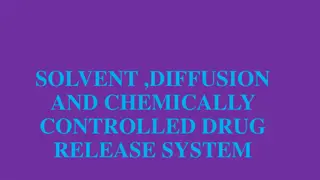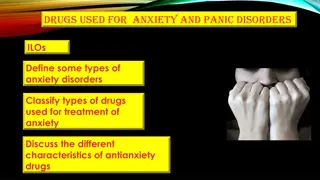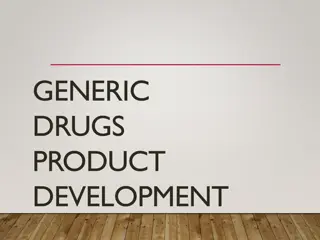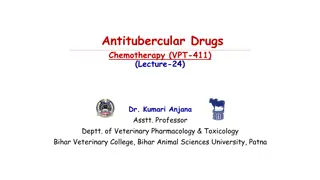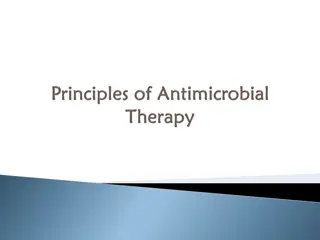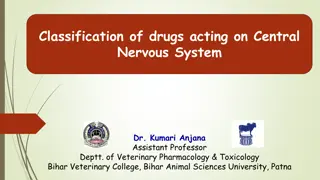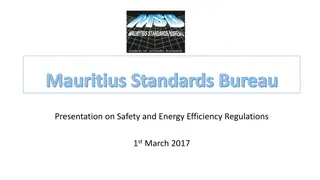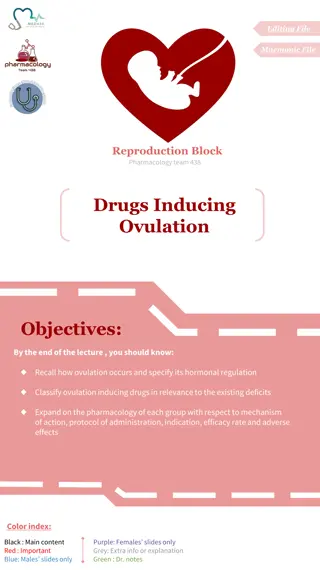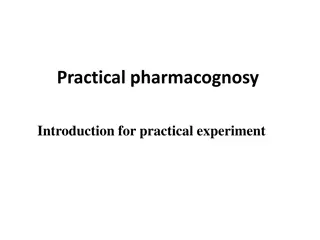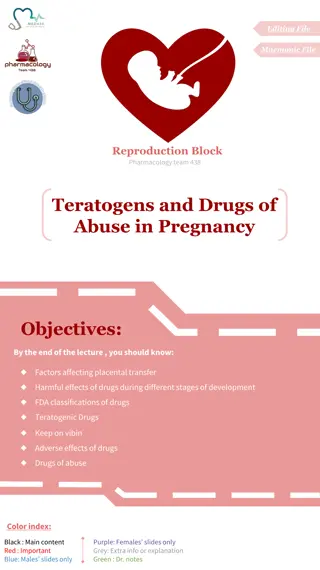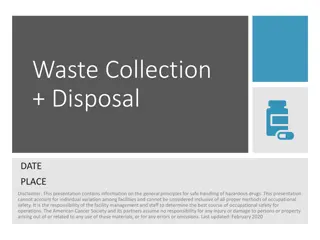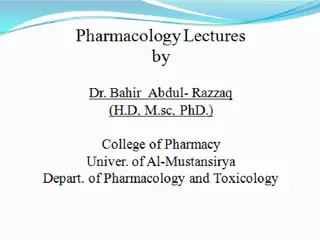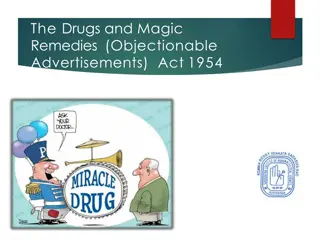Healthcare Professionals and Controlled Drugs: Regulations and Responsibilities
Wendy McAllister, a former Metropolitan Police CDLO, provides insight on managing situations involving healthcare professionals and controlled drugs. The discussion covers scenarios such as substance abuse by pharmacists, nurses, and doctors, along with legal implications and cooperation mandated by the Health Act 2006. The importance of disclosure, privacy rights, and civil liability in disclosure decisions is emphasized.
Download Presentation

Please find below an Image/Link to download the presentation.
The content on the website is provided AS IS for your information and personal use only. It may not be sold, licensed, or shared on other websites without obtaining consent from the author.If you encounter any issues during the download, it is possible that the publisher has removed the file from their server.
You are allowed to download the files provided on this website for personal or commercial use, subject to the condition that they are used lawfully. All files are the property of their respective owners.
The content on the website is provided AS IS for your information and personal use only. It may not be sold, licensed, or shared on other websites without obtaining consent from the author.
E N D
Presentation Transcript
Sharing Information & Investigation Wendy McAllister Controlled Drugs Security Consultant Former Metropolitan Police CDLO (Controlled Drugs Liaison Officer)
Should we say something? Pharmacist receives cannabis warning Nurse smoking crack in a phone box Nurse who leaves her toddler home alone Dr taking recreational drugs in a night club Nurse admitted to A&E following an overdose Nurse who stabs her husband twice with 10 knife Nurse who assaults her young daughter & two police officers IF CD s INVOLVED - Health Act 2006 applies
Powers and Policy Health Act 2006 Sec 18 Co-operation between health bodies and other organisations (1)The relevant authority may by regulations make provision for or in connection with requiring responsible bodies to co-operate with each other in connection with (a)the identification of cases in which action may need to be taken in respect of matters arising in relation to the management or use of controlled drugs by relevant persons CD + HCP + Crime = HA2006
Powers and Policy Regulation 31 of the Controlled Drugs (Supervision and Management of Use) Regulations 2006 31. Civil proceedings do not lie against a person in respect of loss, damage or injury of any kind suffered by another person as a result of the disclosure of information in good faith under regulation 25, 26, 29 or 30 Revised in 2013 regulations 15 & 16 state responsible bodies are required to co-operate to protect patients & the general public.
Common Law Police Disclosure When determining disclosure at any level the following should be applied: Right to privacy Impact of disclosure to individual and if necessary company they work for Necessity Relevance to role Whenever contemplating disclosure to a partner agency you should consider the main themes: Record Reveal Retain As per the previous slide, legislation dictates that if acting correctly, an individual will not be subject to civil liability.
Common Law Police Disclosure There may be issues regarding the need to inform the individual that their details will be disclosed to the partner agencies. This naturally can impact on a fast moving investigation, where witnesses may still be sought, evidence still to be retrieved, and potential witness intimidation. There is scope to justify NOT to inform the individual, but it must be well documented, reasoned and be subject to robust defence and challenge. Case by case basis. The CLPD process involves extensive documentation. The police have adapted the CLPD process to be more succinct and relevant to the role of a CDLO. Usual shared documents include custody record, recorded interviews, relevant witness accounts, search records. Metropolitan Police Disclosure Team are always on hand to advise colleagues. All forces will have a similar department.
Management of Police Information Police services often share intelligence/information with each other as long as it s for a policing purpose MOPI (Management of Police Information) 1. Protecting life or property 2. Preserving order 3. Preventing the commission of offences 4. Bringing offenders to justice 5. Any duty or responsibility arising from law or statute law
Information Sharing Record, Reveal, Retain. Record what you are sharing. Record why you are sharing. PLAN Proportionate, Legal, Accountable, Necessity. Review. Patient Safety. Risk of not sharing intelligence. Security of websites (PNN). Be satisfied that the person needs to know.
Internal Investigations CD s missing? Patient harmed? Suspect known? When should you report incidents to the police ? Previous issues? Check drugs charts / PMR Suspicious behaviour? Check the CD register
Internal Investigations Senior member of staff Not socially acquainted with the suspect Experienced Who should investigate? Someone with time to conduct the investigation Someone easily contactable
Internal Investigations CQC Line / Ward manager HR Agency Who should be informed ? Safe guarding team NMC / GMC / GPhC / HCPC Colleagues CDAO at NHSE (CD reporting tool) Police / CDLO
Internal Investigations Drug test Retrieve staff pass/swipe access cards Make drug a full sch 2 Suspension FULL CD audit What actions could / should be taken? Escort off the premises Change door codes Search locker Interview the suspect/witnesses Secure the CDR/drugs charts Conditions of practice
Internal Investigations Criminal conviction NFA Removed from register Potential outcomes OH referral Written warning Dismissal Conditions of practice remain Unsolved crime
